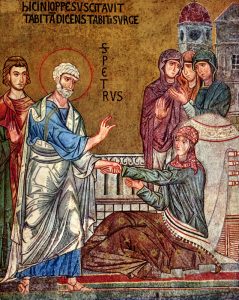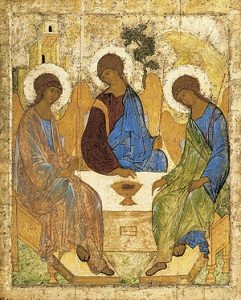Revised Common Lectionary Reflection, Fourth Sunday of Easter, Year C
May 12, 2019
Lessons: Acts 9:36-43; Psalm 23; Revelation 7:9-17; John 10:22-30
Theme: Once God’s faithful and generous people are alive in Christ and ready to get up and go when called upon.
Key Scripture: Peter put all of them outside, and then he knelt down and prayed. He turned to the body and said, “Tabitha, get up.” Then she opened her eyes, and seeing Peter, she sat up. – Acts 9:40
Preaching/Teaching Reflection
 Yes, I know it’s Good Shepherd Sunday, but how about focusing the homiletical lens more tightly one of Jesus’ sheep, a certain disciple by the name of Tabitha, whose story is told in the Acts passage? There’s a lot we can learn from her story, much that can inform our own discipleship in 21st century North America.
Yes, I know it’s Good Shepherd Sunday, but how about focusing the homiletical lens more tightly one of Jesus’ sheep, a certain disciple by the name of Tabitha, whose story is told in the Acts passage? There’s a lot we can learn from her story, much that can inform our own discipleship in 21st century North America.
We don’t know much about Tabitha, whose Greek name is Dorcas, except that she is generous with her resources (acts of charity) and “devoted to good works.” We know that she made clothes for widows, indicating that her discipleship was relational. The fact that she had an upstairs room may indicate that she was a woman of wealth and stature in the community. And, we know that she became ill and died.
This is not, however, the end of the story. Peter, the disciple who in last week’s lesson had gone back to fishing, is now fully engaged in ministry in the nearby town of Joppa. Peter is able, by the power of the Holy Spirit, to restore Tabitha to life, and in the process gave glory to God and caused many to believe.
If you’re wondering how in the world this connects to the Good Shepherd Sunday theme, remember that the risen Christ is the shepherd not only of the flock but also of every individual sheep—the collective and the particular. Tabitha was one sheep who heard the voice of Jesus calling to her through the witness of others, and she in turn became a powerful witness to the good news.
Tabitha’s story reminds us, too, that we may walk through dark valleys and face physical death, but not even death is not the end of our stories. Tabitha is raised by Peter to a second chance at life, another glimpse of the kingdom now. We will be raised from death to life that does not die. Yes, we are particular disciples and individual followers (or sheep) of the One who  defeated death. The risen Christ goes before us and no one can snatch us away from him. We are individuals, yes, but we are also one in Christ, united with all of creation in life that death cannot destroy. The flock is large, but each one of us is treasured, known, and never left alone.
defeated death. The risen Christ goes before us and no one can snatch us away from him. We are individuals, yes, but we are also one in Christ, united with all of creation in life that death cannot destroy. The flock is large, but each one of us is treasured, known, and never left alone.
Tabitha’s story is important because it reminds us that discipleship matters. We never know what any particular day will bring. Will we live to see tomorrow? Will we tumble into eternity tonight? Whatever the answer, however many days or years our lives may span, what we do have is this present moment. We have relationships worth cultivating, treasuring, and celebrating. We have work to do that matters. We have abundance to share with neighbors near and far. And we have amazing good news to share. We are stewards of Tabitha’s story, of the stories of many other faithful witnesses like Peter and Paul and Mary and Martha, and of our own story that is being written every single day.
Most of all, we are stewards of the story of Jesus, of a God who loves the world so much that nothing could or can stand between us and that divine love, of the Good Shepherd who is carrying us home, and of the risen Christ who is restoring this world one disciple, one sheep, one atom and molecule at a time. Like Tabitha, let’s get up and get going. Our Shepherd calls!
In Worship
Who are the “Tabithas” in your congregation—faithful women (or men) who are “devoted to good works and acts of charity”? Why not honor them today? Do you have a quilting group, a food pantry and/or clothing bank committee, a card ministry, or Eucharistic ministers? Invite those who are willing to share their stories of ministry and faith. Give thanks for the faithful work of the disciples in your context, many of whom work quietly and behind the scenes without desire for recognition.
With Youth
What does it mean to “know” something. In this week’s gospel lesson, the temple leaders want a plain explanation of whether Jesus is the Messiah. Jesus says his works, done in God’s names, testify to the truth. How do we “know” the truth about Jesus? We’ve never seen him or touched him, as he lived centuries ago. How do we hear his voice? If Jesus and God are one, what does that mean for us, since we belong to Christ?
Share a copy of Rublev’s Icon of the Holy Trinity to talk about the unity of Father, Son, and Spirit. Fr. Richard Rohr notes that there’s a hole on the icon in the location of the empty place at the table. Some art critics speculate that a mirror was once glued there so that we can see ourselves in relationship, in unity, with God. Invite youth to ponder what it means to dine with God. How do we experience that in Holy Communion? How do we share this in our own hospitality?
With Children
This week’s focus verse is Psalm 23:1 – The LORD is my shepherd, I shall not want.
Share with the children a story of something you really, really wanted—something that occupied your every thought and dream, something you thought you couldn’t live without. What’s the end of the story? Did you get it? No? Does it matter all these years later?
The Good Shepherd, who we understand to be Jesus, will not let us be in want. That doesn’t mean we’ll get everything we think that we want, but rather that Jesus will always be with us in good times and hard times. It doesn’t mean our lives will always be easy, but that we will have the most important things we need, like our community of faith, relationships that matter, and a way to follow that leads to real life for ever.
How do we follow this Good Shepherd? We listen for Jesus’ voice in scripture, preaching, and teaching. We experience Jesus in communion, baptism, and in the beloved community that is Christ’s Body here on earth. This is how we follow Jesus, our Good Shepherd. This is how we learn to live without wants, trusting that our needs will be met and that we will dwell in God’s house our whole life long.
Finish with a simple prayer and blessing.
Weekly Stewardship Bulletin Insert
Tabitha is one example of a faithful steward in action, one who was “devoted to good works and acts of charity.” Who has been a “Tabitha” in your life, someone who represents faithful discipleship? How might Christ be inviting you to follow in her (or his) footsteps?
Stewardship at Home
This week practice being a sheep—not literally, of course—but rather practice listening for Jesus’ voice guiding and calling you. Spend some time in quiet prayer, study of scripture, and paying attention to the world around you as you go about your daily activities. Can you hear Jesus calling?
2016 Reflection: https://www.stewardshipoflife.org/2016/04/the-voice/
2013 Reflection: https://www.stewardshipoflife.org/2013/04/a-stewards-psalm-for-all-seasons-and-reasons/
Photos: Sonny Abesamis, Art in the Christian Tradition, Wikimedia. Creative Commons usage license. Thanks!
Note: Reprint rights granted to congregations and other church organizations for local, nonprofit use. Just include this note: “Copyright (c) 2019, Rev. Sharron Blezard. Used by Permission.” Other uses, please inquire: thewritelife@hotmail.com.




Leave a Reply